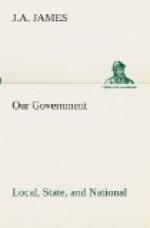Some provisions of these laws will now be stated, (1) Charges must be just and reasonable. The Interstate Commerce Commission has power to decide what is reasonable, and to fix rates, after an investigation. (2) It is unlawful to give one person or corporation a better rate than another for the same service. This is called “discrimination.” Passes cannot be granted, except to employees. (3) All rates must be posted where they can be consulted by any person. (4) All companies engaged in interstate commerce must open their books to inspection by the commission and must make reports that they require. (5) If any person objects to a decision of the commission, he may appeal to the Commerce Court, which has been created to consider such cases.
The Control of Trusts.—Among the abuses arising in connection with interstate commerce are those which result when persons enter into agreements or combinations to prevent free competition; for under these circumstances prices are raised, or certain persons are favored in trade. In 1890, Congress passed a law prohibiting such combinations “in restraint of trade or commerce among the several States or with foreign nations.” This is known as the Sherman Anti-trust Law.-Now, a trust is simply a large corporation which has absorbed or killed off, more or less completely, other establishments engaged in the same industry. The trust may or may not have a monopoly, that is, complete control in that line of business; and it may or may not be engaged in interstate commerce. An agreement among certain, railroad companies to establish and maintain freight rates was declared to be in violation of the law of 1890. Also, a combination, or “conspiracy,” among railroad employees to stop the running of trains was declared illegal.
The “trust problem,” which is so prominent in current political discussion, is the question of preventing the evils of combination in industry. These evils become evident when excessive prices are charged by persons who control certain lines of business; that is, when free competition is prevented in the production, transportation, or sale of commodities. If the business conducted by a trust lies entirely within the limits of a single State’s boundaries, then it must be regulated by State law.
III. THE MONEY of THE UNITED STATES.
Our National Currency.—Another of the most important powers of Congress is that granted in the following clause:—
Article I, Section 8, Clause 5. To coin money, regulate the value thereof, and of foreign coin, and fix the standard of weights and measures.
In civilized countries it is the practice of the government to furnish the people a “circulating medium” for use in trade and commerce. Two kinds of money are in use in the United States: (1) coin or specie; and (2) paper money. The total amount of money in circulation in the United States on November 1, 1910, was $3,124,679,057 or $35.01 per capita for the whole population. We shall first consider the coins of the nation.




